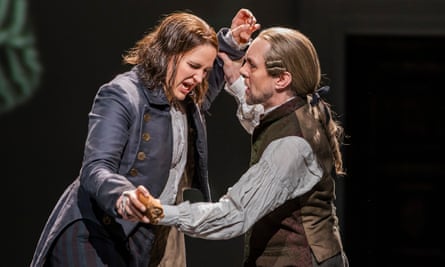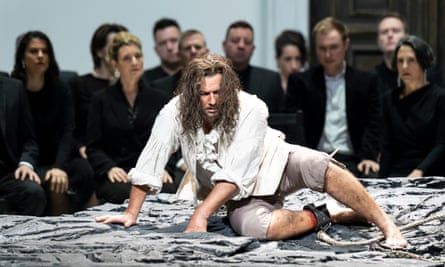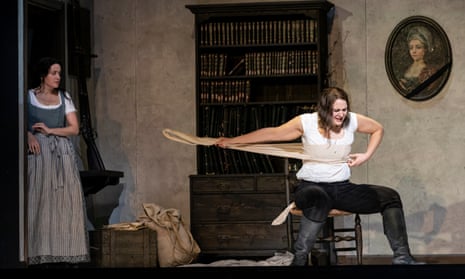Tobias Kratzer’s new production of Fidelio turns Beethoven’s only opera into a parable about the nature of political engagement and our frequent complacencies in seeking to avoid it. It’s a curious, broken-backed piece of theatre in many respects. Kratzer openly acknowledges the novel structure of an opera that begins as a domestic drama and ends with a universal paean to freedom and love. Instead of viewing it, however, as a unified work that evolves stylistically from the conventions of singspiel to the communal rituals of oratorio, he tells us in his programme synopsis that “like no other opera” Fidelio falls into “unequal halves” – and he effectively rips it in two.
The first act plays out in period, in a French prison at the height of the post-revolutionary Terror, a nightmarish place out of Piranesi, where loutish warders oversee mass executions, and to which women, Marzelline (the jailer’s daughter) apart, are only permitted access to collect the severed heads of the dead. Kratzer’s iconoclasm is readily apparent, however. A glaring neon proscenium frame constantly reminds us that what we are watching is a theatrical illusion. That Marzelline (Amanda Forsythe) soon becomes aware of the true gender of Lise Davidsen’s disguised Leonore twists the narrative into new territory and, when we reach Act II, we are in a very different place.

The prison is replaced by a brightly lit drawing room where the 18th-century trappings are rapidly dismantled, and the chorus, now in modern dress, sit on stage throughout as silent witnesses to the unfolding drama of liberation. Video projections of their reactions, empathetic yet fearful of intervention, are streamed across the walls, and it is only after Jonas Kaufmann’s Florestan has been freed that they readily permit themselves involvement in the jubilation of the final scene. Kratzer’s point, that the silent majority all too frequently resist political engagement until after events have nearly run their course, unquestionably resonates with our own times, but has little to do with Beethoven’s vision of divine providence working through human activity to establish true justice on earth.
This is a shame, because musically the evening at times approaches greatness. Davidsen, more than fulfilling the high expectations placed on her, makes a phenomenal Leonore. Hers is a great voice, superbly controlled and beautifully equalised throughout its range, able to encompass the long phrases of Abscheulicher without breaking them in two, as one all too often hears. She’s a fine actor, too, conveying Leonore’s anguish, hopes and fears with considerable subtlety. Kaufmann, singing with an apology for being “under the weather” on opening night, sounded a bit under pressure in O Namenlose Freude. Elsewhere, though, there were fine things: a darkly intense account of his opening aria, and a real sense of elation in the final scene.

Simon Neal’s Pizarro, meanwhile, masks evil with lofty refinement and misguided zeal. Georg Zeppenfeld is an exemplary Rocco, handsomely sung, and tellingly conflicted between bourgeois self-interest and genuine altruism. Kratzer makes more of Forsythe’s Marzelline and Robin Tritschler’s Jaquino than the score really supports, allowing the former to espouse revolutionary idealism, while the latter becomes increasingly reactionary: both give fine performances, though neither voice is large. In the pit, Antonio Pappano sculpts the score with great dignity and care. It’s superbly played, and the choral singing is simply thrilling.

Comments (…)
Sign in or create your Guardian account to join the discussion